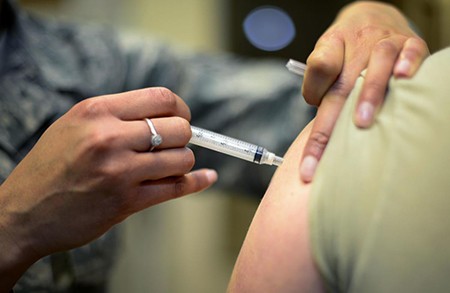Are you planning an international trip to climb Mount Kilimanjaro or do a safari in Africa? Or perhaps you’re heading to a Costa Rican jungle to zipline, raft or see some monkeys.
Then, along with making sure your passport is up to date, it’s wise to schedule a visit with an infectious disease expert in a travel clinic so you can stay as healthy as possible during your trip.

If you are wondering what a travel clinic is, don’t worry. You’re not alone. Many people don’t realize that as you book international flights and plan your itinerary for work or a fun adventure, you also will want to plan to avoid getting illnesses like yellow fever, typhoid fever, malaria and COVID-19.
To answer common questions about travel clinics and vaccines for illnesses ranging from traveler’s diarrhea to Ebola, Zika, and mpox, we consulted with Dr. Andrés Henao, director of the travel clinic at UCHealth University of Colorado Hospital.
Vaccination requirements for global travel are complex and can be confusing. You can check out guidance online from the U.S. Centers for Disease Control and Prevention (CDC). But it’s really helpful to get advice from pros like Henao, who can analyze exactly where you’re traveling and advise you about which travel vaccines you should get and which you can skip.
Henao is from Cali, Colombia, where he developed an early interest in tropical medicine and rare diseases.
In particular, Henao researches what are known as neglected tropical diseases. They affect many people in remote areas but don’t attract research funding or attention from large scientific or pharmaceutical companies.
“They are forgotten diseases that affect the poorest of the poor,” Henao said. “These illnesses cause vicious cycles of poverty.”
Henao loves research because scientific discoveries can affect large populations of people. For example, he’s been studying a disease called Chaga, which comes from the kissing bug. It can cause heart problems, resulting in strokes and sudden death for those who get the disease.
“Many of these tropical infectious diseases have a disproportionate effect on minorities and people living in poverty,” Henao said.
Henao did his internal medicine in infectious disease training in Texas, then did advanced training in infectious diseases during a fellowship at the University of Colorado School of Medicine on the Anschutz Medical Campus, where he is an associate professor.
Henao’s mission is to keep as many people as healthy as possible.
Here’s his advice about how to avoid getting sick when you travel.
What is a travel clinic?
Travel clinics are health centers where specially trained infectious disease experts consult with patients before traveling for fun, work, study-abroad programs, or volunteer trips.
Who needs to visit a travel clinic?
“Any international traveler is a good candidate for pre-travel counseling,” Henao said. “We make sure they are fully immunized before they go.”
The one exception for U.S. residents is travel to western Europe. Fully vaccinated travelers who are headed to Europe typically won’t encounter any unusual diseases, Henao said.
But he encourages anyone going to Mexico, Central American, South America, Asia, and Africa to take the time to visit a travel clinic to consult with an infectious disease expert. A consultation at a travel clinic is especially essential for those visiting rural and less developed areas.
Who is at greatest risk of getting sick during travel?
Patients staying for relatively short periods in nice hotels in well-developed areas have the lowest risk of getting sick, Henao said.
Others visiting rural or developing regions are at greater risk of getting sick during international travel.
“We also have travelers who are immigrants from Africa, Mexico, or Central or South America. They’ve been living in the United States, but they’re going back to visit family. That group of people might have increased risk,” Henao said.
Others like flight attendants, students who are volunteering or taking classes abroad, and people who are working internationally in remote locations also can be at higher risk due to frequent travel or longer stays in developing areas, he said.
What are the most common illnesses that people get while traveling?
One of the most common illnesses is traveler’s diarrhea.
Henao and colleagues at the UCHealth travel clinic typically prescribe medications for diarrhea that travelers can take with them in case they get exposed to food or water that makes them sick. If you get a stomach bug or diarrhea during a trip, it’s wonderful to have medications ready.
People who take cruises can be exposed to common stomach bugs like norovirus and enterovirus that spread easily at food buffets or in crowded settings.
Contaminated food and viruses also can cause people to get hepatitis.
And Henao and his colleagues are constantly keeping an eye on new disease outbreaks around the world — from cholera to dengue and, of course, COVID-19.
What are some of the most common destinations patients are planning to visit when they seek help from medical travel experts at travel clinics?
Popular destinations include Indonesia, Vietnam, Thailand, Peru, Brazil and Argentina, Henao said.
“We also see people doing safaris in Africa and visiting places like South Africa, Kenya and Tanzania,” he said.
Other popular spots in South America include Brazil and Machu Pichu in Peru (when there’s not political unrest).
Henao and his colleagues give tailored guidance for each person’s trip. They’ll ask about your plans. Will you be primarily in cities and well-established areas? Will you be staying in a fancy hotel or a basic hostel? Will you be venturing into rural areas, rafting, zip-lining or spelunking in a cave? If so, you might be exposed to bats or dogs that could carry rabies.
Or, you might be in an area where mosquitoes are common. Infected mosquitos can spread diseases like Zika, West Nile, Chikungunya, dengue, and malaria.
Do travel doctors also help patients who are doing mountain expeditions and might need help with exposure to high elevations?
Yes. The UCHealth travel medicine clinic has an expert who consults with patients about high-elevation adventures. Dr. Elaine Reno is an emergency medicine specialist who focuses on high-altitude medicine.
“The most common mountain we see travelers heading to at this time is Mount Kilimanjaro,” Henao said.
In addition, to keep mountain climbers safe and healthy, Reno and her team have been studying the best water purification methods at high altitudes and also have been studying the safety of high-altitude expeditions during pregnancy.
How far before an international trip should you schedule a travel clinic appointment?
See an expert at a travel clinic at least a month or two before your trip (if possible). If you are taking a last-minute trip, do your best to get vaccinations before you go.
As soon as you book your flights, it’s wise to check on availability, as many doctor’s offices and clinics are experiencing wait times for appointments. Some vaccines take up to 2 weeks to become fully effective. If patients elect to do preventive treatments like antimalarial drugs, they’ll need to start taking medications before the trip (and in some cases) and continue to take them for weeks after they return.
Are appointments with infectious disease experts at travel clinics covered through insurance?
Yes. Most insurance plans cover travel clinic visits, just as they do other visits to doctor’s offices. Staying up to date on vaccines to prevent illnesses makes much more sense than dealing with the challenges and costs of a debilitating illness later. Check with your insurance provider in advance to be sure your visit to a travel clinic is covered.
Are travel vaccinations typically covered under health insurance plans? I hear some of the more unusual travel vaccines can be expensive.
Basic vaccines like the ones for flu and COVID-19 are covered through insurance plans. Some of the more unusual travel vaccines or preventive medications are more expensive.
A pro at a travel clinic will help you assess your risk depending on where you’re traveling. Then you can consider which vaccines or medications you need and which you can skip.
You can also check with your health insurance company to check in advance how much you’ll be charged for individual travel vaccines.
At the University of Colorado travel clinic, there’s a special pharmacy that serves patients in the infectious disease clinic. It’s conveniently located right next door to the travel clinic. The pharmacists there are pros at helping travelers. For instance, if you need medications to prevent typhoid, the pharmacists will give you a bag with an ice pack since the medication must stay cold to be effective.
If travelers need prescriptions in addition to vaccines, they can easily pick them up at the adjacent pharmacy.
Do I need to bring my vaccine records to a travel clinic appointment?
If you are a regular patient in a health system, then your electronic medical record should be updated and will include all of your vaccine records. The same is true if you’re a Colorado resident and you have received previous vaccines in Colorado. Your medical providers can look up vaccination records through the Colorado Department of Public Health and Environment. At the UCHealth travel clinic, providers can easily look up your vaccination records.
But, if you are visiting a clinic or doctor for the first time or you’ve moved to a new state, it’s wise to bring your vaccine records with you.
Will a doctor review my full vaccine record and discuss what travel vaccinations I need during a visit to a travel clinic?
Yes. Henao and his colleagues spend time during visits to travel clinics to make sure patients are fully vaccinated for common illnesses like the flu and COVID-19. They also address less common diseases like yellow fever that patients might encounter during international travel.
“We always take the opportunity to go over regular immunizations,” Henao said.
For instance, a patient might come in specifically for a yellow fever vaccine.
“When people are traveling, that gives us the opportunity to also vaccinate them against seasonal flu, to give them a booster for COVID-19 or to make sure they’ve received their hepatitis-B series.”
“We provide both the specific immunizations needed for travel and the routine vaccines needed for health maintenance,” Henao said. “Some patients might not have been in touch recently with their primary care doctor.”
Do you encounter vaccine hesitancy from some patients?
Yes. Since the start of the pandemic, misinformation has spread widely, causing some patients to be hesitant about some vaccines, Henao said.
“For one reason or another, it’s the vaccines for flu and COVID-19 that seem to cause more angst for some people,” he said.
Henao takes time to listen to patients’ concerns. He explains that all of the vaccines that the clinic administers are safe and highly effective. Having witnessed the potential danger of COVID-19 and many more unusual illnesses first-hand, Henao strongly encourages patients to protect themselves against vaccine-preventable illnesses.
Some people worry about side effects. He explains that side effects — if there are any — usually don’t last long. And dealing with a short-term side effect is far better than getting a dangerous or deadly disease.
“We do a lot of education,” Henao said. “We try to help people overcome their fears as much as possible.”
Henao always assures patients that he, himself, is fully vaccinated and that his family members — both in the U.S. and in Colombia — are as well.
For some people, it helps that Henao is fluent in Spanish and can speak to Spanish speakers in their native language. He knows that advice from a trusted doctor is very persuasive for people who are hesitant about vaccines. So, Henao gives clear direction to patients.
“I am very firm about recommending all vaccines. I cannot stress enough how important and necessary vaccines are for helping people stay healthy,” he said.
Once he listens to people’s concerns and shares his experience, he finds that most people choose to get fully vaccinated.
“I explain why each vaccine is necessary and that they are very effective and important for keeping people healthy. I have already received these vaccines myself, and I recommend them to my family members.”
Where is yellow fever common, and why is the illness dangerous?
Yellow fever spreads in tropical areas of Africa and Central and South America, Henao said.
It’s a viral illness spread by infected mosquitoes.
Normally in cities, the risk of getting yellow fever is relatively low. But there have been recent outbreaks in Venezuela and Brazil, Henao said.“It’s important to be aware of yellow fever because it can be fatal in up to 50% of people who get it,” he said.
In addition to recommending vaccines, Henao talks to travelers about using clothing and repellants to prevent as many mosquito bites as possible.
What about rabies? Should travelers routinely get vaccinated against rabies?
Rabies is a risk for some international travelers, but not everyone. Reducing exposure may be best for most people.
“We recommend staying away from street dogs and not trying to pet them,” Henao said.
He and his colleagues recommend the rabies vaccine for people at high risk.
“We normally reserve the vaccine for people who are going to handle animals, like veterinarians or people who are going abroad for work and may have extensive contact with animals,” Henao said.
“If a person is going to stay in a country for several months, that can increase the risk for rabies. So, we assess the individual need for that vaccination,” he said.
What about malaria? Is there a vaccine, or should patients consider taking antimalarial medications before a trip?
There is no vaccine for malaria, but there are prescription medications that a traveler can take if necessary.
A consultation is wise because antimalarial medications can cause unpleasant side effects.
“With malaria, we will review a person’s destination and itinerary to see if they’re going to an area that is high risk,” Henao said.
If patients will be in a high-risk area, Henao will prescribe prophylactic or preventive courses of antimalarial medications.
And, of course, it’s always wise to wear protective clothing and use repellants to reduce mosquito bites.
What about typhoid fever?
Typhoid fever is a bacterial illness caused by contaminated water or food. It can spread from person to person or when people don’t or can’t wash their hands well.
“We have two vaccines available for typhoid,” Henao said. “One is an oral medication that comes in capsules that you will take four times every other day. Usually, the protection of the oral vaccination lasts for about five years.
Patients can also choose to get a single shot to prevent typhoid. The protection from that vaccine lasts for about two to three years.
Do travel doctors also discuss plans for sexual activity with patients?
Yes. It’s important for patients to be open with doctors about their plans. The recent global outbreak of mpox — previously known as monkeypox — was spreading primarily through men who were having sex with other men.
There is a vaccine now for mpox, and travelers can reduce their risk and get vaccinated.
“The mpox outbreak is under better control now, but there’s still an ongoing risk. Normally it’s related to sexual activity. If people are planning to go to parades or festivals where they could potentially engage in sexual activities that increase the risk of mpox or sexually-transmitted diseases, we want to address that.
“As part of our consultation, we always ask about activities people are planning to do,” Henao said. “It’s best to take precautions.”
Editor’s Note: The Colorado Times Recorder occasionally posts articles, like this one, from UCHealth Today, which is published by UCHealth, the hospital associated with the University of Colorado School of Medicine. Our goal is to provide as many people as possible with accurate information about medical issues that are poisoned by misinformation, particularly as discussed on social media and talk radio.




